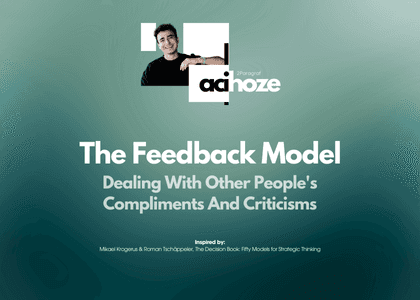The Power of Feedback: A Key to Growth in Communities and Projects
Giving and receiving feedback is not an easy process. In fact, it is one of the most sensitive topics in group work. A simple compliment can lead to overconfidence, while strong criticism can damage self-esteem. But if we learn how to use feedback properly, it becomes a powerful tool — not only for personal development, but also for community growth.
The important point is that we should be able to criticize each other easily — with kindness and honesty. We should speak openly and say what we really think. Such an environment also encourages open communication and builds trust.
Understanding the Feedback Model
The feedback model goes beyond the usual question: “What was good and what was bad?”
Instead, it asks us to think: “What can I do with this feedback?”
This mindset helps us understand what should stay the same and what needs to change — even if something worked well in the past.
The model is not just about identifying failures. It also helps us understand how we should react to feedback. When we manage feedback correctly, it turns into a clear plan for improvement. And sometimes, we need to ask ourselves: “Was this success real, or was it just luck?”
A Classic Example
Let’s imagine you win a football match, but in the replay, you see that the ball hit the post and went in by chance. Did you win with strategy, or was it just good luck?
In the same way, if someone gives you a compliment after an event, ask yourself: “Did I really earn this praise, or was it just coincidence?”
Asking such questions honestly helps us improve and grow.
How We Used the Model at RiseTalks
In my university community, I lead a project called RiseTalks. I’ve seen how powerful feedback can be when used correctly. After every event, we send a short feedback form to the participants. In this form, they share what they liked, what we can improve, and what they expect next time.
These responses are very valuable to us. We learn what worked well, and what needs improvement. More importantly, our members feel heard and appreciated.
We are building a culture where giving feedback is not scary — it’s normal. And in a space where people can freely share their thoughts, the community grows much faster and stronger.
A Note to Myself (and to Turkish Airlines)
As someone who dreams of working as a project manager at Turkish Airlines one day, I know that good leadership starts with good listening.
If I manage a team or a project in the future, I want to create a feedback-friendly system — not just at the end of the project, but during every step.
People should feel free to speak honestly. And I want to ask myself regularly: “Is this success truly mine, or was it a lucky moment?”
Because this kind of thinking makes me a more responsible and aware leader.
